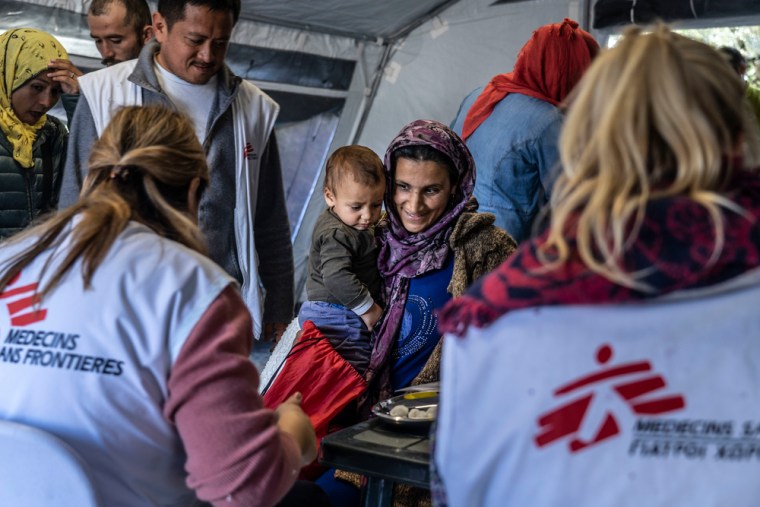Posted on June 8, 2021
CREDO funding helped Doctors Without Borders/Médecins Sans Frontières respond to the global pandemic
Doctors Without Borders/Médecins Sans Frontières (MSF) is an independent international medical humanitarian organization that provides emergency aid to people affected by armed conflict, epidemics, natural disasters, and exclusion from health care, regardless of race, religion, gender or political affiliation.
Thanks to CREDO members who enabled us to donate $52,665 to Doctors Without Borders/Médecins Sans Frontières in 2020, the organization was able to care for more than 10 million people caught in some of the world’s worst emergencies, and CREDO support made MSF’s rapid response to the COVID-19 pandemic possible.
Because of the support in part from CREDO and our members in 2020, MSF teams were able to quickly adapt to a world with COVID-19 and prepared its 400+ programs for this global threat — implementing infection prevention measures, reorganizing patient flow in hospitals, and training health care and nursing home staff. As the pandemic spread, MSF rapidly scaled up COVID-19 treatment capacity and focused on some of the hardest-hit areas, many in locations where it had never worked before.
At the same time, MSF teams continued to treat children suffering from malnutrition, war wounded and burn victims, and people with malaria, HIV, tuberculosis, and other diseases. While caring for patients, MSF continued its innovative efforts to stem the spread of antibiotic resistance and responded to other emergencies, including mass displacements in Syria and outbreaks of Ebola and measles.

MSF vaccinates 2,000 children who due to the terrible living conditions, including the lack of basic sanitation, severe overcrowding, and extremely limited access to healthcare, coupled with the forthcoming winter, are extremely vulnerable to illness. Photo © Anna Pantelia/MSF
Below are a few examples of successful medical humanitarian responses MSF conducted this past year thanks to CREDO’s support:
Launching Dedicated COVID-19 programs
From Yemen and Iraq to Ivory Coast and South Africa, from Cambodia and Malaysia to Haiti and Brazil, MSF opened dedicated COVID-19 medical projects in hard-hit countries, strengthened infection prevention and control (IPC) across their programs to protect staff and patients alike, and prepared for this global threat to health systems.
Sustaining Essential Medical Care Amid a Global Pandemic
In many of the places where MSF works—where health systems are already fragile and people live in precarious conditions—keeping essential health services available and accessible is vital to prevent losing more lives, whether from measles, malaria, malnutrition, or complicated pregnancies. Since the beginning of the pandemic, MSF has sought to keep essential medical services up and running for the millions of patients who rely on MSF while also preparing for and responding to the threat of the virus itself.
Ensuring Vaccinations for Deadly Diseases
In many parts of the world, parents already struggle to protect their children from vaccine-preventable diseases such as measles and whooping cough, which claim hundreds of thousands of young lives each year. The COVID-19 pandemic is putting vaccination programs all over the world at serious risk, and the repercussions on the youngest lives could be devastating.
Last spring, as a massive measles epidemic continued to grip the Democratic Republic of the Congo (DRC), MSF Emergency Response Teams vaccinated 260,000 children during one of their first campaigns since the COVID-19 pandemic began. In September, MSF also vaccinated 50,000 children between the ages of 6 months and 14 years in Timbuktu, Mali, where several cases had been reported.
Safeguarding Reproductive Health Care for Women and Girls
Reproductive health care is essential to preventing maternal and neonatal mortality, but the health needs of women and girls are often neglected in the midst of an emergency—and COVID-19 is no exception. All over the world, MSF teams are seeing women and girls cut off from the health services they need due to closures of health facilities, cuts in services, and supply shortages. The impact is especially severe in places with weak or overburdened health systems.
MSF has therefore adapted its programs to ensure continued access to vital care for women and girls, for instance by using telehealth for prenatal and postnatal care in Arauca, Colombia and for counseling for sexual violence victims in Rustenburg, South Africa. At a MSF project serving refugees on the island of Samos, Greece, camp residents with medical backgrounds have been trained to identify individuals with health needs and use telehealth to connect those patients with the MSF team for care.
To learn more and get involved with MSF’s life-saving medical humanitarian work, please visit www.doctorswithoutborders.org or follow the organization on Twitter, Instagram or Facebook.

